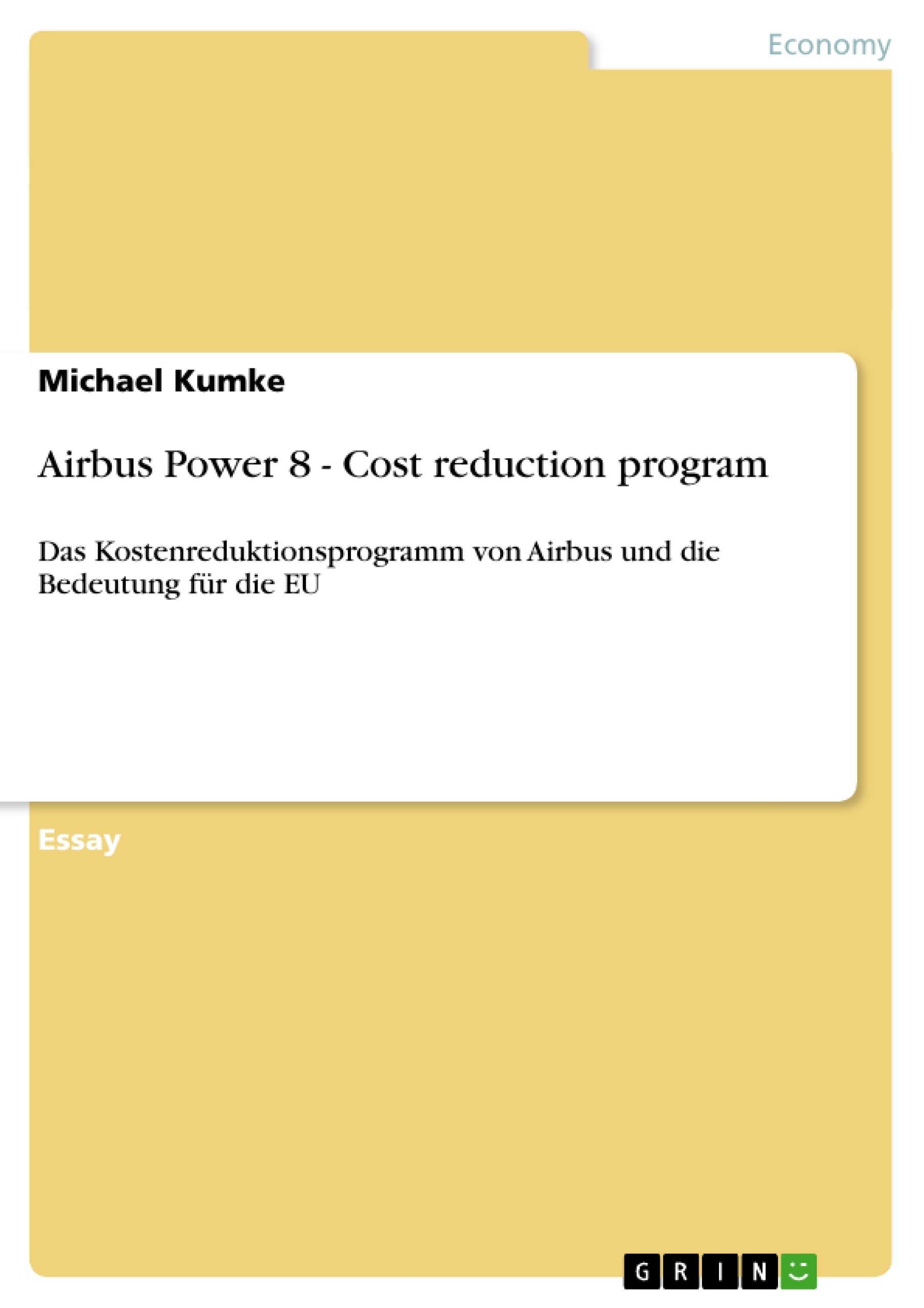In times of Globalization and Internationalization major national companies become “global” in terms of structure, purchase or production. Great “geopolitical” supra national bodies like the European Union ( EU ) play an important role in terms of regulating trade-traffic or improving the economic standard for its members. The multinational aircraft manufacturer, Airbus S.A.S, is a good example to emphasize how corporate goals do not always equate with EU ideals.
The purpose of this report is to identify those disputes relating to the current cost reduction program of Airbus called “Power 8”. By handling the agenda the lead question will be discussed. Recommondations in the last part mention proposals concerning political issues in regional and environmental policy. As a whole this report gives an overview concerning the disputes of a margin orientated company and the EU with the economic interest of all its members.
Inhaltsverzeichnis (Table of Contents)
- Airbus' Power 8 - Power for Europe?
- Airbus - the company
- Cost Reduction Program Power 8 And Its Necessity
- The EU's interest in Airbus
- Power 8's effect on the EU
- Recommendation on policies
Zielsetzung und Themenschwerpunkte (Objectives and Key Themes)
This report aims to examine the disputes arising from Airbus' cost reduction program, "Power 8," and its implications for the European Union (EU). It will explore how corporate goals may not always align with EU ideals and analyze the potential consequences of Power 8 on the EU's economic and political landscape.
- The impact of globalization and internationalization on multinational companies
- The role of the EU in regulating trade and improving economic standards for its members
- The complexities of reconciling corporate goals with EU objectives
- The potential consequences of cost reduction programs like Power 8 on the EU's economy and politics
- Recommendations for policy changes in regional and environmental areas.
Zusammenfassung der Kapitel (Chapter Summaries)
The report begins by introducing Airbus as a multinational company with its headquarters in Toulouse. It then focuses on the company's presence in four EU member states: France, Germany, the UK, and Spain. Each section provides an overview of Airbus' operations, including manufacturing sites, key roles in the company, and workforce size in each country.
The report continues by highlighting the increasing importance of non-EU countries like China, Japan, the USA, and Russia in terms of working conditions and tax policies. However, it emphasizes that the focus will remain on the EU countries mentioned earlier.
The report concludes by providing a brief overview of Airbus' key statistics, including its turnover, number of employees, and worldwide presence.
Schlüsselwörter (Keywords)
This report focuses on the key themes of globalization, internationalization, the European Union, Airbus, cost reduction programs, economic interests, and policy recommendations. It examines the complexities of reconciling corporate goals with EU objectives and the potential impacts of Power 8 on the EU's economy and politics.
Frequently Asked Questions
What is the "Power 8" program at Airbus?
Power 8 is a major cost reduction program launched by Airbus to improve competitiveness and streamline operations across its European manufacturing sites.
How does Airbus's structure conflict with EU ideals?
While the EU aims for economic balance among members, Airbus's corporate goals for margin orientation and cost-cutting can lead to job losses and site closures in specific member states like France or Germany.
Which countries are most affected by Airbus operations?
The primary EU member states involved are France, Germany, the United Kingdom, and Spain, where Airbus maintains significant manufacturing sites and workforces.
What is the EU's interest in Airbus?
The EU views Airbus as a strategic industrial asset that provides thousands of high-tech jobs and maintains Europe's position in the global aerospace market.
What role do non-EU countries like China and Russia play?
Globalization has led Airbus to consider partnerships and production sites in non-EU countries to take advantage of different tax policies and labor conditions, increasing pressure on European sites.
What are the recommendations regarding regional policy?
The report suggests proposals for political adjustments in regional and environmental policies to better align corporate restructuring with the economic interests of all EU members.
- Citation du texte
- Michael Kumke (Auteur), 2007, Airbus Power 8 - Cost reduction program, Munich, GRIN Verlag, https://www.grin.com/document/135340



